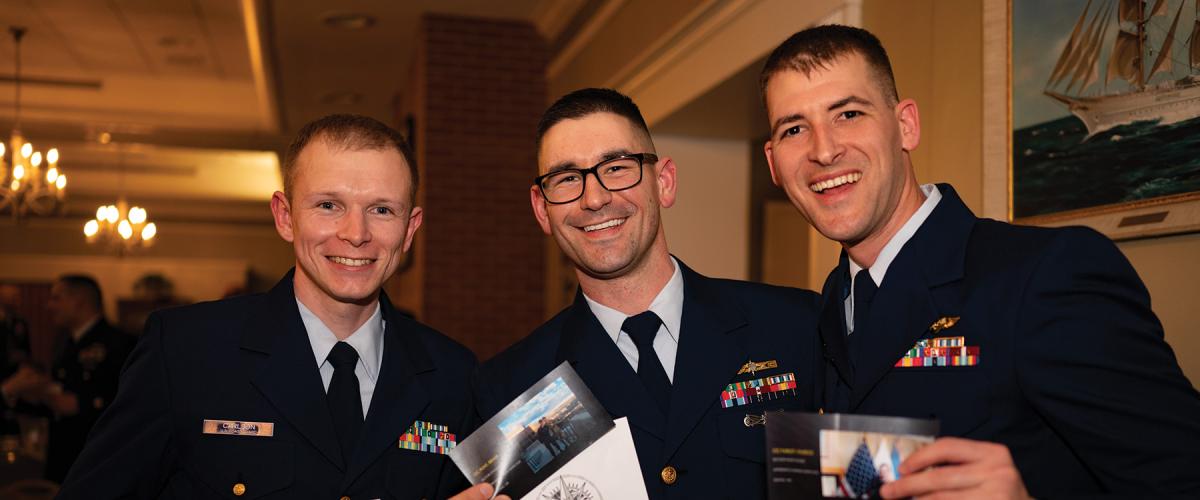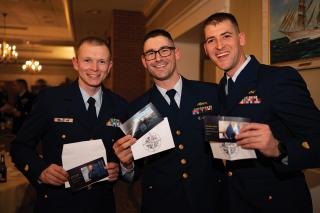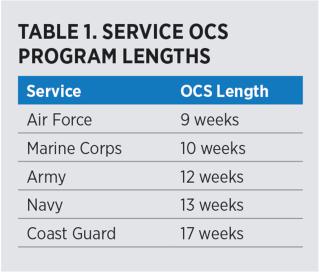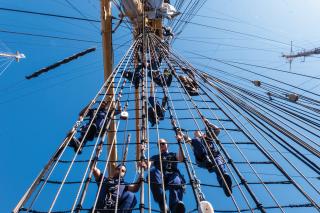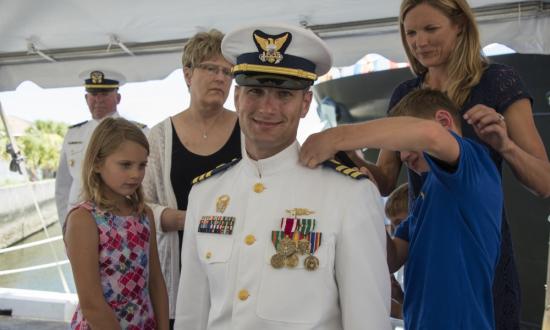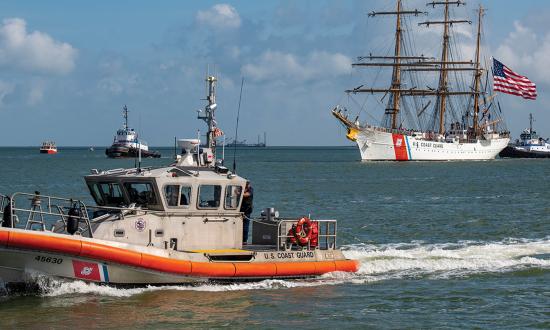For more than a decade, the Coast Guard has conducted its 17-week Officer Candidate School (OCS) in New London, Connecticut, as a primary accession source for new officers. Although the program is highly effective at shaping exemplary officers, it is not keeping up with demand, particularly given current personnel shortages. Shortening OCS from 17 weeks to 12 would allow the Coast Guard to add a third OCS company per year, another Direct Commission Officer (DCO) class, or a Reserve Officer Candidate Indoctrination (ROCI) class.
An Overview of OCS
Currently, the Coast Guard runs two OCS classes per year. The first week is indoctrination, a stressful time meant to replicate boot camp. At the conclusion of week one, candidates enter the seven-week junior phase, which typically culminates in a two-week training cruise on board the USCGC Eagle (WIX-327). On their return, they participate in senior status, with both increased responsibility and privileges, for their final seven weeks. Billet night usually occurs in the first week of senior phase and is when the officer candidates receive their billets. While junior phase evaluates candidates’ fitness for service and determines a rank order for billet night, senior status prepares them to serve in their anticipated billets.
This 17-week curriculum is significantly longer than any other OCS program (see Table 1). Part of the difference is that other than Coast Guard aviators, Coast Guard OCS graduates do not attend a secondary school, such as Surface Warfare Officers School for new Navy ensigns, and instead immediately report to their first units. To bridge the gap between OCS and the fleet, Coast Guard OCS includes “Core and Strand” (C&S) programming following billet night. Candidates are organized into sections, or “strands,” based on their career paths, and the staff tailors the academic courseload of the final six weeks to prepare them for the fleet.
OCS classes 2-22 and 1-23 graduated 78 and 86 officer candidates, respectively, commissioning 164 ensigns for calendar year 2022—or about a third of the 478 ensigns commissioned in that calendar year.1
Limitations on Accessions
Chase Hall, where all Coast Guard Academy cadets, OCS candidates, and ROCI candidates live, puts physical constraints on officer recruiting. Of the 52 weeks per year, OCS uses its share of Chase Hall for 34 weeks, while ROCI uses an additional 5 weeks. Under the current arrangement, the Coast Guard could not add another 17-week OCS class to the calendar. Chase Hall’s space constraints also make it impossible to increase the size of either the officer candidate or Academy classes.
Moreover, the Leadership and Development Center (LDC), which runs the accession sources other than the Academy, is understaffed. Even if Chase Hall could accommodate more officer candidates, the staff likely would be unable to keep up with the increased workload.
Advantages of Shortening
Shortening Coast Guard OCS by five weeks would bring it in line with its sister services and allow LDC staff to use that time to add a third OCS class, a second ROCI class, or an additional DCO class, depending on the needs of the service. A third OCS class would allow the Coast Guard to commission approximately 80 additional new officers every year—officers who will be needed to crew the Coast Guard’s expanding fleet of Legend- and Sentinel-class cutters, as well as new offshore patrol cutters and polar security cutters. The offshore patrol cutters will replace the medium-endurance cutters (WMECs) and are expected to have an approximately 125-person complement: 25 more than a 270-foot WMEC and 50 more than a 210-foot WMEC.2
The Coast Guard also needs more reservists and more officers with specialized skills, such as attorneys and engineers. A second ROCI class would add another 80 reserve ensigns to fill critical billets and provide further bench strength to the officer corps. An additional DCO class would add up to 40 more officers. None of these additional programs are feasible while OCS remains at 17 weeks.
If funds are not available to add classes, the Coast Guard could simply save the money from shortening OCS by five weeks, for example, the food costs for 80–90 officer candidates for those weeks. Shortening OCS also would reduce the time officer candidates are away from their families. Although the primary advantages of a 12-week OCS are the opportunity to run additional courses and commission more officers, shortening the program by itself has some positive aspects.
How to Trim Five Weeks
Option 1: Eliminate C&S. C&S is meant to provide officer candidates meaningful coursework to prepare them for the challenges of the fleet. In practice, however, hands-on experience in the fleet offers superior instruction.
Newly commissioned ensigns arrive at their commands essentially as blank slates. There is no expectation they will have earned relevant job qualifications while at OCS. The current curriculum gives afloat officer candidates no hands-on experience on a cutter, providing just one day of instruction on T-boats. Similarly, prevention officers will make no headway on inspector or investigator qualifications while at OCS, and response officers will not break in at a command center or earn Incident Command System qualifications. C&S is primarily classroom instruction; officer candidates would be better served with on-the-job training at their first units.
OCS sampled this course of action for OCS class 2-20. Although the class was intended to run for the full 17 weeks, the COVID-19 pandemic intervened, and the candidates graduated almost a full month early. Eighteen months later, the promotion board selected 83 of the 84 graduates of the class for promotion to lieutenant (j.g.). Their success suggests C&S coursework is unnecessary.
Option 2: Eliminate Indoctrination Week and Four Weeks of Junior Phase. The first five weeks of OCS instill basic customs and courtesies, knowledge of ranks and ratings, uniform maintenance, and physical fitness. The material taught in these weeks also is covered at boot camp. So, for the lion’s share of officer candidates—those with prior Coast Guard service or who are earning their commissions through the College Student Pre-commissioning Initiative—who already have completed eight weeks of boot camp at Cape May, the early weeks of OCS are redundant.
New accessions are not required to graduate from boot camp. In an OCS class of some 85–90 candidates, there typically are 15–20 new accessions. If the Coast Guard required them to attend boot camp, it could shorten or even eliminate the first weeks of OCS. The Coast Guard would not be the only service to require new accessions to attend boot camp. Army officer candidates must complete the ten-week Army Basic Combat Training course before attending OCS.
More Officers, Less Money
The Coast Guard has been running a 17-week OCS for decades, with little thought for the inefficiency. It would be better served with a shorter program that would allow it to commission more officers and save money. Although it would require an overhaul of the OCS curriculum, it would bring the Coast Guard into line with its sister services, all of which successfully train officers in 9 to 13 weeks. The Coast Guard has an opportunity to improve manning with a relatively easy fix. It ought to reassess the length of OCS.
1. Office of Personnel Management, “2023 Register of Officers,” 20 March 2023.
2. U.S. Coast Guard Acquisition Directorate, “Stage 2 of the Coast Guard Offshore Patrol Cutter Moves Forward,” 5 October 2022.



